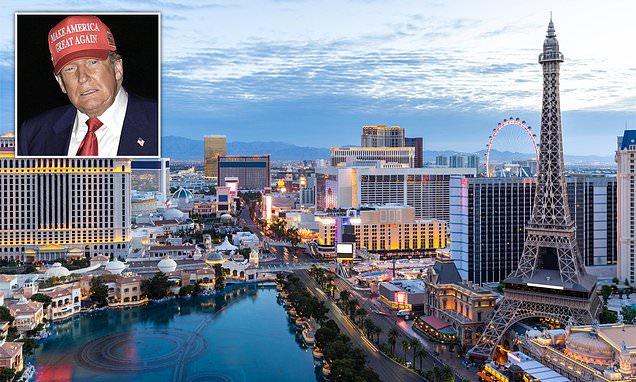Las Vegas Tourism Slump Signals Wider Economic Challenges
Waning Visitor Numbers Highlight National Economic Pressures
Las Vegas, historically renowned as a vibrant epicenter of tourism and economic strength, is experiencing an unexpected drop in visitor activity this summer. According to recent analyses, the city’s famed resorts and casinos are witnessing a notable decline in patronage, sparking concerns about the broader economic landscape across the United States. This downturn not only threatens the vitality of local enterprises but also serves as a potential early warning of deeper economic difficulties on a national scale.
Contributing factors to this tourism downturn include:
- Escalating costs for flights and accommodations discouraging budget travelers
- Rising interest rates diminishing disposable income for many households
- Post-pandemic shifts toward more affordable and low-key entertainment options
- Global economic uncertainties prompting cautious spending and travel decisions
| Metric | Summer 2023 | Summer 2024 | Percentage Change |
|---|---|---|---|
| Hotel Occupancy | 82% | 68% | -17% |
| Casino Revenue | $1.8 Billion | $1.5 Billion | -16.7% |
| Visitor Count (millions) | 10.2M | 8.7M | -14.7% |
This decline in Las Vegas tourism acts as a barometer for the U.S. economy’s overall health, signaling potential headwinds for sectors such as hospitality, retail, and entertainment.As consumers become more conservative with their spending,businesses reliant on tourism revenue may need to adjust operations,including scaling back expansions and reducing workforce sizes. These developments underscore the urgent necessity for economic policies aimed at boosting consumer confidence and stimulating demand.
Local Economy and Employment Face Meaningful Strain
The reduction in tourist arrivals this summer has sent shockwaves through Las Vegas’ local economy,particularly impacting small businesses that depend heavily on visitor spending. Restaurants, retail outlets, and entertainment venues report a sharp decline in foot traffic, leading to considerable revenue losses. The outlook remains uncertain, with economic headwinds and evolving travel behaviors clouding forecasts for the upcoming months.
Areas most affected include:
- Hospitality Industry: Lower bookings have resulted in staff layoffs and reduced operating hours.
- Service Providers: Taxi drivers, tour operators, and event planners are experiencing income drops.
- Retail Sector: Sales in souvenir shops and luxury boutiques have fallen significantly.
| Industry | Revenue Decline (%) | Employment Change (%) |
|---|---|---|
| Restaurants & Bars | 18% | -12% |
| Retail Stores | 22% | -9% |
| Entertainment Venues | 15% | -10% |
Experts caution that these downturns jeopardize not only thousands of jobs but also the broader economic stability of the region. As employment contracts and household incomes shrink, consumer spending in other local sectors may also decline, perhaps triggering a wider economic slowdown. Without strategic intervention or a resurgence in travel demand, the city’s reputation as a premier entertainment destination could suffer long-term damage.
Shifting Consumer Preferences Reshape Travel Patterns
Emerging data reveals a significant transformation in consumer travel and leisure spending habits. Instead of gravitating toward traditional hotspots like Las Vegas, many travelers now favor destinations that offer wellness, outdoor recreation, and authentic cultural experiences. This trend reflects a growing preference for meaningful and cost-effective travel over the high-energy, luxury-focused vacations that once dominated the market.
- Growth in Eco-Tourism: Locations featuring national parks, hiking, and environmentally friendly resorts are gaining popularity.
- Shorter, Frequent Trips: Weekend escapes are increasingly preferred over longer vacations due to time and budget constraints.
- Domestic Travel Surge: With ongoing international travel uncertainties, more people are exploring destinations within their own countries.
| Category | 2019 Spending (%) | 2023 Spending (%) | Change |
|---|---|---|---|
| Las Vegas & Major Urban Centers | 45% | 30% | â–Ľ15% |
| Nature & Outdoor Destinations | 20% | 35% | â–˛15% |
| Wellness & Retreats | 10% | 18% | â–˛8% |
| Domestic Tourism Overall | 50% | 65% | â–˛15% |
This shift in traveler priorities presents a formidable challenge for established tourist destinations that have traditionally relied on high-volume, luxury-seeking visitors. To remain competitive, travel operators and local economies must innovate by offering more personalized, value-driven experiences. Failure to adapt to these evolving consumer demands risks continued revenue declines and negative impacts on the broader travel industry.
Strategic Policy Measures to Boost Tourism and Economic Recovery
Revitalizing Las Vegas’ tourism sector requires a comprehensive approach that balances immediate stimulus with sustainable growth strategies. Focused marketing efforts highlighting the city’s diverse attractions beyond gambling—such as world-class entertainment, culinary experiences, and outdoor activities—can broaden its appeal to new demographics. Additionally, simplifying travel protocols and easing restrictions will encourage more visitors, particularly from international markets still grappling with pandemic-related travel barriers. Collaboration between public and private sectors is essential to fund infrastructure improvements that enhance visitor experience and safety, including upgraded public transportation and contactless technologies.
- Expand digital outreach with targeted campaigns aimed at younger travelers and niche markets
- Offer tax breaks to hospitality businesses investing in sustainable and innovative practices
- Support local entrepreneurs to preserve authentic cultural offerings and diversify the tourism portfolio
- Develop year-round events and festivals to stabilize visitor numbers across seasons
Implementing a data-driven recovery plan with clear benchmarks will be critical.Below is a suggested framework for tracking progress and refining policies:
| Performance Indicator | Goal | Review Frequency | Responsible Entity |
|---|---|---|---|
| Hotel Occupancy Rate | 75% by Q4 2024 | Monthly | Las Vegas Convention and Visitors Authority |
| Visitor Expenditure | 15% Year-over-Year Increase | Quarterly | City Economic Advancement Office |
| Public Transit Ridership | 10% Growth from 2023 Levels | Quarterly | Regional Transportation Commission |
| Small Business Revenue Growth | 20% Increase by Year-End | Biannual | Local Chamber of Commerce |
Conclusion: Navigating the Path Forward
The sharp decline in Las Vegas’ summer tourism serves as a critical indicator of shifting consumer behavior and broader economic uncertainties. As a city once emblematic of robust consumer confidence and discretionary spending, its current challenges highlight potential vulnerabilities in the national economy. Stakeholders must remain vigilant and proactive, leveraging innovative strategies and policy interventions to foster recovery and sustain Las Vegas’ status as a premier destination in an evolving travel landscape.




